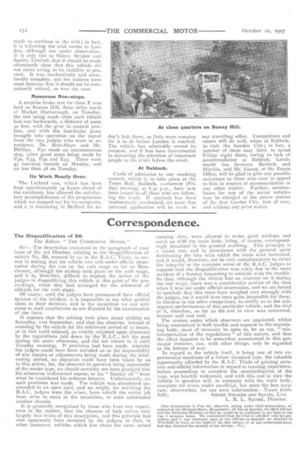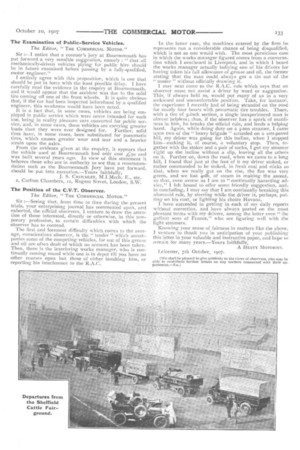Correspondence.
Page 20

Page 21

If you've noticed an error in this article please click here to report it so we can fix it.
The Disqualification of B8.
The Editor, " TUE CONIMERuIAL MOTOR," Sir :—The description contained in the paragraph of your issue of the 3rd October, relating to the disqualification of vehicle No. B8, entered by us in the R.A.C. Trials, is correct in stating that the vehicle writ still under official observation during the run on the 121.11 stage as far as Manchester, although the mishap took place on the loth stage, and it is, therefore, difficult to explain the action of the judges in disqualifying this vehicle at this point of the proceedings, when they had arranged for the allotment of officials for the t2th stage.
Of course, until the judges have pronounced their official opinion of the incident, it is impossible to say what guided them in their decision, and in the meantime we can only come to such conclusions as are dictated by the examination of the facts.
It appears that the mishap took place about midday on Saturday, 21st September, and that the observer, instead of • standing by the vehicle for the minimum period of 12 hours, or in fact until relieved, as strictly enjoined upon observers by the regulations laid down by the R.A.C., left his post during the same afternoon, and did not return to it until Tuesday morning. If provision had been made, whereby the judges could have been satisfied as to the impossibility of any repairs or adjustments being made during the intervening period, no objection could have been taken by us to this action, for, the observer in question being apparently of the tender type, we should certainly not have grudged him his otherwise well-earned repose, or his " Sunday off " from what he considered his arduous labours. Unfortunately, no such provision was made. The vehicle was abandoned unattended in an open yard, and we might, for anything the R.A.C. judges were the wiser, have rebuilt the entire job from stem to stern in the meantime, or even substituted another chassis.
It is generally recognised by those who have any experience in the matter, that the dement of luck enters very largely into trials of this description, and this principle has also apparently been accepted by the judges, in that, in other instances, vehicles which lost about the same actual running time, were allowed to make good mishaps and catch up with the main body, being, of course, correspondingly penalised in the general marking. This principle is a sound one, and in accordance with the general spirit dominating the idea with which the trials were instituted, and it would, therefore, not he very complimentary to either the integrity or the common sense of the R.A.C. judges to suppose that the disqualification was solely due to the mere accident of a Sunday happening to coincide with the trouble.
So that, although the vehicle had an observer on it during the last stage, there was a considerable portion of the time when it was not under official observation, and we are forced to conclude that this must have weighed very strongly with the judges, for it would have been quite impossible for them, in fairness to the other competitors, to certify as to the subsequent performances of this particular vehicle, and the trial of it, therefore, so far as the end in view was concerned, became null and void.
The system under which •observers are appointed, whilst being economicabin both trouble and expense to the organising body, must of necessity be open to, let us say, " misinterpretation of the regulations " of this nature, and that the effect happens to he somewhat accentuated in this particular instance, can, with other things, only be regarded as the fortune of war.
In regard to the vehicle itself, it being one of two ex perimental machines of a future standard type, the valuable opportunity afforded by the R.A.C. Trials of gaining accurate and official information in regard to running experience, before proceeding to complete the standardisation of the type, was heartily welcomed, and with this end in view the vehicle in question will, in company with the main body, complete the trials under unofficial, but none the less accurate, observation, for our own information.—Yours SIDNEY STRAKER AND SQUIRE, LTD. L. R. L. SQUIRE, Director.
[Our information is that the observer, acting under Club instructions, re mained at the Midland Hotel, Manchester, all day on Sunday, the 2,2nd
and the following Monday, so that he might be in readiness to get back to the van if occasion arose. We understand that the Club is satisfied with his procedure, and it was obviously open to the officials to dispatch an observer to Wirssford, by road, on the night of the 21st ultimo, or at any subsequent hour, had they doubted the security of the storage. En.]
The Examination of Public-Service Vehicles.
The Editor, "THE COMMERCIAL Mcrroa."
Sir :—I notice that a coroner's jury at Bournemouth has put forward .a very sensible suggestion, namely : " that all mechanically-driven vehicles plying for public hire should be in future examined before passing by a fully-qualified, motor engineer."
I entirely agree with this proposition, which is one that should be put in force with the least possible delay. I have carefully read the evidence in the enquiry at Bournemouth, and it would appear that the accident was due to the solid tire coming off one of the front wheels. It is quite obvious that, if the car had been inspected beforehand by a qualified engineer, this weakness would have been noted.
It is a fact that, in some cases, vehicles are being employed in public service which were never intended for such use, being in reality pleasure cars converted for public service, and, in some cases, these vehicles are carrying greater loads than they were ever designed for. Further, solid tires have, in some cases, been substituted for pneumatic tires, which causes greater wear and tear and a heavier strain upon the axles.
From the evidence given at the enquiry, it appears that the vehicle used at Bournemouth had only cost ,4.:,-30 and was built several years ago. In view of this statement it behoves those who are in authority to see that a recommendation such as the Bournemouth Jury have put forward, should be put into execution.—Yours faithfully, J. S. CRrreamEv, M.I.Mech. F., etc. 2, Carlton Chambers, 12, Regent Street, London, S.W.
The Position of the C.V.T. Observer,
The Editor, "THE COMMERCIAL MOTOR."
Sir :--Seeing that, from time to time during the present trials, your enterprising journal has commented upon, and exhorted, the official observers, I venture to draw the attention of those interested, directly or otherwise, in this temporary profession, to certain difficulties with which the observer has to contend.
The first and foremost difficulty which comes to the average, conscientious observer, is the " tender " which accompanies some of the competing vehicles, for out of this grease arid oil are often dealt of which no account has been taken. Then, there is the interfering works manager, who is continually coming round while one is in depot till you have no other courses open but those of either insulting him, or reporting his interference to the RA.C.
In the latter case, the machines entered by the firm he represents run a considerable chance of being disqualified, which is not as one would wish. The most pernicious case in which the works manager figured comes from a conversation which I overheard in Liverpool, and in which I heard the works manager actually bullying one of his drivers for having taken his full allowance of grease and oil, the former stating that the man could always get a Lin out of the "tender " without officially drawing it.
I may next come to the R.A.C. rule which says that an observer must not assist a driver by word or suggestion.
This, if always held to, would put many of us in a very awkward and uncomfortable position. Take, for instance, the experience I recently had of being stranded on the road for nearly four hours with pneumatic tire troubles. There, with a tire of 5-inch section, a single inexperienced man is almost helpless; thus, if the observer has a spark of manliness in him, he breaks the official rule, and lends a helping hand. Again, while doing duty on a 5-ton steamer, I came upon two of the " heavy brigade " stranded on a sett-paved hill, my driver was going for this incline, when I stopped him—making it, of course, a voluntary stop. Then, together with the stoker and a pair of sacks, I got my steamer right up the incline without a slip, leaving all the others on it. Further on, down the road, when we came to a long hill, I found that just at the foot of it my driver stoked, or rather commanded to be stoked, in fresh coal and sticks so that, when we really got on the rise, the fire was very green, and we lost golb. of steam in making the ascent, so that, even averse as I am to "continually hazarding advice," I felt bound to offer some friendly suggestion, and, in concluding, I may say that I am continually breaking this aforesaid rule, by steering while the driver is, perhaps, put. ting on his coat, or lighting his choice Havana. I have succeeded in getting in each of my daily reports without correction, and have always parted on the most pleasant teems with my drivers, among the latter even " the gallant sons of France," who are figuring well with the light steamers.
Knowing your sense of fairness in matters like the above, I venture to thank you in anticipation of your publishing this letter in your valuable and instructive paper, and hope to remain for many years.—Yours faithfully, A HEAVY MOTORIST.
Leicester, 7th October, 1907.
I We shall be pleased to give publicity to the views of observers, who may ho able to contribute further letters on any ?natters connected with their experiences—ELL-I




























